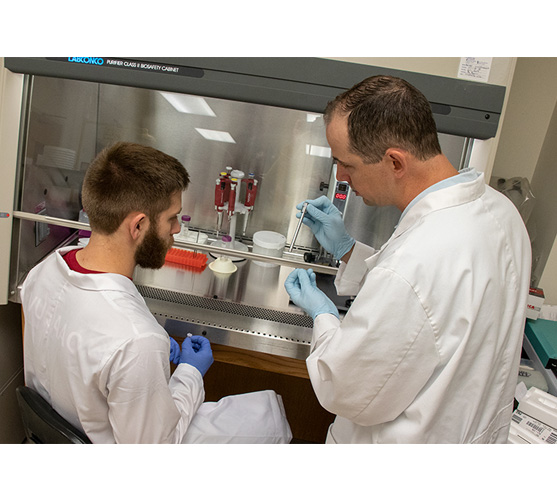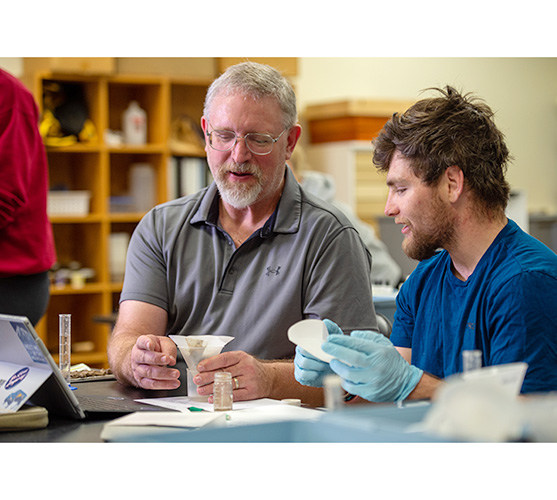Prepare for a Thriving Career with Viterbo’s Biology Program
The BS in Biology program follows the core learning concepts and competencies as determined by the National Science Foundation’s (NSF) Vision and Change in Undergraduate Science Education Initiative. Majors in biology develop the expertise and skills needed to pursue in-demand careers or continue their education in various graduate programs. Studying biology provides a comprehensive understanding of complex scientific issues and the relationships between science, technology, and the world.
You will gain hands-on experience by working alongside faculty experts in paid summer internships focused on biological fields. We offer exceptional partnerships with leading employers and organizations, which provide a variety of additional internship opportunities.
As a biology major, you will benefit from learning in small classes and closely collaborating with faculty. Our programs and curriculum allow you to customize your study of biology to help achieve your educational and professional goals.
Explore Viterbo's Biology Degree
Biology (BS)
Gain a breadth of knowledge within the biological sciences with our biology BS degree, including cellular and molecular biology, anatomy and physiology, ecology, behavior, evolution, and a specialized area you choose. We offer a student-centered learning environment that includes hands-on experiences, career exploration, research, and internships within the curriculum.
Biology (Minor)
The biology minor requires 15-16 total credits. Transfer courses, waivers and/or substitutions, and prerequisite courses could modify these credit totals.
Science Education (Minor)
If you want to teach science in Grades 6–12, our science education minor provides the qualifications to teach biology, chemistry, or general science. The minor requires 27-28 credits, but transfer courses, waivers, and/or substitutions could modify these credit totals.
Environmental Science (Minor)
Humans are inescapably connected to the environment. It provides us with what we need to survive—food, clean air, water, and the building blocks of medicine.
If you are concerned about the human impact on our world, an environmental biology minor is an excellent choice. You will connect with the natural world through a flexible program with a broad-based background in biology, chemistry, environmental science, and sustainability. This minor takes an integrated approach to environmental studies with a systems-level view of how organisms interact with the environment.
Sport Science (Minor)
Because of the rapidly growing sports and leisure industries, there is a large demand for professionals with a strong background in science, research, exercise science, human performance, and psychology combined with management and ethical leadership skills.
The sport science minor introduces you to the complexities of sports science. You will also gain the experience you need for graduate school or a career in many professions, including the sports industry. Sport management and leadership majors are not eligible for this minor.
Biology Program Highlights and Advantages
Choose Viterbo’s biology major and minors and benefit from:
- Strong focus on grad school preparation. Prepare for graduate studies by taking advantage of our professional school prep courses for exams such as the MCAT, DAT, OAT, GRE, and others. We maintain articulation agreements with professional programs, some of which offer 3+1 programs and early acceptance to their programs.
- Ideal location for the study of life sciences. Majors in biology and other life sciences benefit from our La Crosse, Wisc. location. Connect with major hospitals (Gundersen and Mayo) for internships, job shadowing, employment, or other opportunities. Intern with organizations such as the U.S. Geological Survey, Mississippi Valley Conservancy, and Genoa National Fish Hatchery. Study the Mississippi River region, including class trips to Mississippi flowage areas.
- World-class scientists on campus. Hear from and engage with renowned expert speakers through our two large symposia—one focused on undergraduate research (Seven Rivers Undergraduate Research Symposium) and another on scientific issues that are particularly important to society (Agnes W. H. Tan Science Symposium).
- Career-focused pre-health advising. Meet regularly with a dedicated pre-health faculty mentor about program progression, course selection, internship possibilities, research opportunities, career paths, and more. Advisors receive training through the National Association for Advisors of Health Professionals.
- Scholarships for life science majors. Our competitive Health Science Scholarship provides one student each year with a full-time tuition award and additional scholarships ranging from $4,000 to $12,000. Departmental scholarships are also available for biology majors and other life sciences fields.
- Learning and mentoring from expert faculty. Your study of life sciences will be led by faculty who know your name, have an open-door policy, and focus on your personal and professional development. Collaborate with faculty members whose research interests include:
What Can You Do With Your Biology Degree?
Biology, biochemistry, and neuroscience degree graduates at Viterbo enjoy a 94% acceptance rate into health-related professional schools and a 90% acceptance rate into other graduate programs (compared to a national acceptance rate of 40–60%).
Our science majors have been accepted into professional schools and programs at:
- Arkansas College of Health Education
- Carroll University
- Case Western
- Concordia University
- Creighton
- Illinois College of Optometry
- Kansas University
- LECOM
- Marquette
- Mayo Rochester
- Medical College of Wisconsin
- Michigan College of Optometry
- Rosalind Franklin
- St. George’s
- Union College Nebraska
- University of Colorado
- University of Iowa
- University of Minnesota
- University of Minnesota-Duluth
- University of South Dakota
- University of Virginia
- UNLV
- UW-La Crosse
- UW-Madison
- UW-Milwaukee
- UW-Stout
Many of our science degree graduates are recruited by employers in areas related to life sciences. Alumni have gone on to work for businesses and organizations such as:
- Area school districts
- Crossing Rivers Healthcare
- Gundersen Health
- Marshfield Clinic
- Mayo Clinic (La Crosse and Rochester)
- Medical College of Wisconsin
- Prairie Moon Nursery
- Prevention Genetics
- Quest Diagnostics
- ThermoFisher
- US Fish and Wildlife
- US Geologic Survey
- University of Michigan Health
- Wisconsin Department of Natural Resources
Examples of Biology Courses
- BIOL 321 - Conservation Biology, BIOL 310 Limnology (field-based courses) – Weekly field studies in the fall include electrofishing for trout, canoeing in the backwaters of the Mississippi, aquatic organism sampling, and birding.
- BIOL 338 - Biomechanics (clinical style course) – Analyze body movement using real-world techniques common in physical therapy and other clinical programs.
- BIOL 347 - Human Physiology, BIOL 482 Human Anatomy – Traditionally two of our most challenging courses, human physiology and anatomy are designed to prepare students who plan to enter health professions programs.
- BIOL 426 - Immunology – Highly relevant to students who lived through the global pandemic, this class features cutting-edge information on immune responses, immunologic disease, vaccines, and infectious diseases with examples that relate specifically to the COVID-19 pandemic.
- BIOL 206 - Health and Graduate Program Exam Review – Prepares students for entrance exams for graduate and medical programs such as the MCAT, DAT, OAT, GRE, or PCAT.
Related Programs
Not the right program for you? Viterbo also offers programs in:






